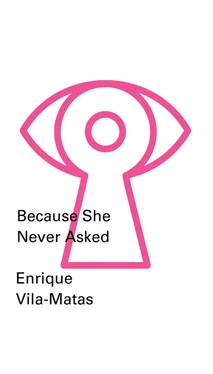Enrique Vila-Matas - Because She Never Asked
Здесь есть возможность читать онлайн «Enrique Vila-Matas - Because She Never Asked» весь текст электронной книги совершенно бесплатно (целиком полную версию без сокращений). В некоторых случаях можно слушать аудио, скачать через торрент в формате fb2 и присутствует краткое содержание. Год выпуска: 2015, Издательство: New Directions Publishing, Жанр: Современная проза, на английском языке. Описание произведения, (предисловие) а так же отзывы посетителей доступны на портале библиотеки ЛибКат.
- Название:Because She Never Asked
- Автор:
- Издательство:New Directions Publishing
- Жанр:
- Год:2015
- ISBN:нет данных
- Рейтинг книги:4 / 5. Голосов: 1
-
Избранное:Добавить в избранное
- Отзывы:
-
Ваша оценка:
- 80
- 1
- 2
- 3
- 4
- 5
Because She Never Asked: краткое содержание, описание и аннотация
Предлагаем к чтению аннотацию, описание, краткое содержание или предисловие (зависит от того, что написал сам автор книги «Because She Never Asked»). Если вы не нашли необходимую информацию о книге — напишите в комментариях, мы постараемся отыскать её.
Stranger on a Train
“Something strange happened along the way,” Vila-Matas wrote. “Normally, writers try to pass a work of fiction off as being real. But in
, the opposite occurred: in order to give meaning to the story of my life, I found that I needed to present it as fiction.”
Because She Never Asked — читать онлайн бесплатно полную книгу (весь текст) целиком
Ниже представлен текст книги, разбитый по страницам. Система сохранения места последней прочитанной страницы, позволяет с удобством читать онлайн бесплатно книгу «Because She Never Asked», без необходимости каждый раз заново искать на чём Вы остановились. Поставьте закладку, и сможете в любой момент перейти на страницу, на которой закончили чтение.
Интервал:
Закладка:
How far away and yet how near everything was, I thought: my hotel in Recoleta, Sophie Calle, the tombs and mausoleums with their funerary flowers, Rita Malú, Eva Perón, me myself as a dangerously missing person overseas.
.
12
I remember how, whenever I would finally feel optimistic, I’d end up suspecting that optimism was just another form of sickness.
.
13
By my fourth day in the hospital, I was able to begin reading a little and I asked for a book by Sergio Pitol. I remembered there was a shocking sentence in it that had always caught my attention—“I adore hospitals”—and I couldn’t recall what came afterwards. What Pitol wrote couldn’t have been closer to my own experience: “I adore hospitals. They bring back the security of childhood: all nourishment is brought to my bedside punctually. All I have to do is push a button and a nurse appears, sometimes even a doctor! They give me a pill and the pain disappears, they give me an injection, and I fall asleep on the spot…”
Nighttime was the most difficult part of all. Pain became more of a blind, insensate spot than my window became a spot of life and the sea. I remember spending time the last night there, exploring the word hospitality . It seemed as good a way as any other to scare the anxiety away and forget I was in a hospital. Luckily, there was a male nurse from Guinea on the night shift, who caught my pensive mood and came to my aid, asking what was on my mind, hoping to calm my disquiet. I told him I was meditating on the word hospitality . First he fell quiet, but then he broke his silence, telling me never to forget that everything was relative. For example, the French had a great reputation for being hospitable people, and yet nobody dared go inside their homes. That made me laugh, and I felt at ease for the rest of the night. But come sunrise, when the first rose-tinged light entered that blind and insensate spot of my window at Vall d’Hebron, the anxiety came back with remarkable strength, and once again I coveted some movement in the air, just one, a single wisp of it: anything that would prove that I was still alive and waiting.
.
14
As I wait for the operation scheduled in a few weeks’ time that is going to fix all my problems, I have to wear an uncomfortable medical device, which hampers my ability to move around: a catheter in my penis. I can go outside if I want to; the catheter empties into a little bag where the urine gathers. It’s tied discreetly around my right leg, under my trousers. It’s well hidden, but for the time being, the only thing I do outside is take a cab to the medical center on Aribau Street for tests, or to the hospital to see the nephrologist or urologist who are caring for me, or sit on the terrace of the café on the corner. Even though the doctor said I’m able to lead a normal life, I only go out when it’s strictly necessary, and then I never stray very far from home.
.
15
I read in a note on the Internet that “the third section of Sophie Calle’s Double Game arose from the invitation she extended to Paul Auster: to become the author of her acts, to invent a fictional character that she would try to resemble; she would try to live out whatever he wanted her to, for a period of one year maximum.” Apparently, Paul Auster didn’t want to take responsibility for what could happen to Sophie, so in exchange, he sent her a few Personal Instructions for S. C. on How to Improve Life in New York City (Because She Asked…). Sophie followed his instructions, and the result was a project titled Gotham Handbook . The rules of the game were: smile at all times, talk to strangers, distribute sandwiches and cigarettes to the homeless, and cultivate a spot of your choice. It lasted for one week in the month of September, in 1994, and the epicenter was a phone booth located on the corner of Greenwich and Harrison. According to Sophie Calle, the result of the operation was as follows: 72 smiles received for 125 given, 22 sandwiches accepted and 10 rejected, 8 packs of cigarettes accepted and 0 rejected, 154 minutes of conversation.
I read it all, and it felt as if years had gone by since I got excited about Sophie’s proposition. My physical collapse had put my health before everything else, and the concerns of our project had been relegated to sixth or seventh place in my life. So much so that Sophie Calle — her first and last names — had become dissociated from what I jotted down daily in my red notebook (I’d been making things up a lot since December).
Every so often, of course, the memory of that note I had read on the Internet returned, and brought to mind the title Paul Auster had given his work, especially the part in parenthesis, Because She Asked . I wasn’t sure why, but I would reminisce about Sophie Calle at the most idiotic moments, and muse obsessively over the phrase, Because She Asked .
Whenever that happened, I couldn’t help but go over everything that had ensued with Sophie, and confirm to myself once again that the ghost of the house on Pico Island had done very well to close the door softly on Rita Malú.
My catheter seems bent on personifying, as is happening as we speak, one of those sneering Harlequins that interrupt the drama developing on stage and untangle the plot.
In fact, the only thing the catheter, the illness, the collapse — whatever you want to call it — did, is doing, is disentangle the plot of my story with Sophie and carry me, softly, ever farther away from her.
III. The Center of the Tangle
1
I thought about a friend yesterday, who said that at some point we all ask ourselves what might have happened had we approached that woman in a different way, if we’d made some move or other that we hadn’t. I recalled something else he said, too: “We think of our past life as if it were a sort of rough draft, something that can be transformed.”
Maybe that’s a good technique for escaping my life in this prison cell of my catheter. Yesterday, I went through my diary entries of the past few months, all the notes I’d been jotting down in my red notebook since last September. They serve as stimulus for reenacting the tale of my relationship with Sophie Calle in my computer. Since she hasn’t made up her mind yet in this story whether or not to live out what I wrote for her in “The Journey of Rita Malú,” I thought I might as well make the jump from literature to my life myself, particularly since the only thing tying me to her now, or to life, is a catheter. So I suggested to myself that I choose a few fragments from my red notebook and, following Petronius (who dared to live out what he had written), carry a few episodes over into real life, or better said, relive them and correct them if need be. As if certain notes written in my diary up to now had merely been the rough drafts of my own life.
.
2
I go over the first lines that I jotted down last year in my red notebook, on the 1st of September: “The sun is rising in the tall windows of my room as I initiate my red notebook or diary in which I’ll write about Barcelona and other nervous cities, asking myself my name, who it is that’s writing these words, and it occurs to me that my study is like a skull from which I spring anew, like an imagined citizen…”
How the hell can I ever bring to life such deeply literary sentences? I’m in the same study where I wrote them down the first time, but now I find it very difficult to feel as though my study were like a skull from which I can spring anew, like an imagined citizen.
I realize that these sentences inaugurating my diary can’t possibly be translated into real life, they’re pure literature. Can I seriously take a leisurely saunter around my study and pretend I’m moving around the inside of a skull? The thought makes me yawn; I mope, and feel more paralyzed than ever. Then suddenly it dawns on me that by yawning, by opening up my mouth, I’ve found the best way of feeling these literary sentences of mine as something experienced . That yawn worked a small miracle, causing me to expand and splinter like an abyss, to merge with the void. In my imagination, only the skull remains, which I am depositing at this exact moment on top of my writing table, like someone placing his head on his desk at work.
Читать дальшеИнтервал:
Закладка:
Похожие книги на «Because She Never Asked»
Представляем Вашему вниманию похожие книги на «Because She Never Asked» списком для выбора. Мы отобрали схожую по названию и смыслу литературу в надежде предоставить читателям больше вариантов отыскать новые, интересные, ещё непрочитанные произведения.
Обсуждение, отзывы о книге «Because She Never Asked» и просто собственные мнения читателей. Оставьте ваши комментарии, напишите, что Вы думаете о произведении, его смысле или главных героях. Укажите что конкретно понравилось, а что нет, и почему Вы так считаете.












